Israeli Defence Minister Says Perpetrators Of Roadside Bombing Will 'Regret' Actions
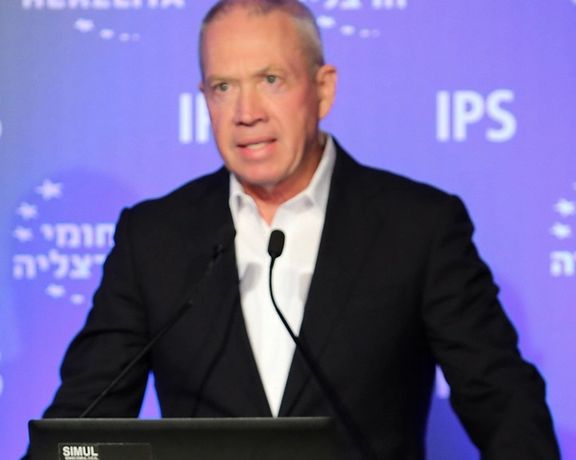
Israel’s Defense Minister vowed tough action in response to a roadside bombing suspected to have been planned by Iran-backed Hezbollah.

Israel’s Defense Minister vowed tough action in response to a roadside bombing suspected to have been planned by Iran-backed Hezbollah.
On a tour of the border between Israel and Lebanon on Thursday, Yoav Gallant said whoever carried out the attack “will regret” its actions. “We will find the right timing and appropriate manner to hit back,” he said.
An explosive device was detonated next to the Megiddo Junction on Monday, severely injuring an Israeli civilian. Soon after, following an extensive search and road blockades, the suspect was found and killed by Israel’s Yamam forces.
“The terrorist was found in possession of weapons, including an explosive belt ready to be activated and additional means. The assumption is that due to the neutralization, an additional terror attack was prevented,” the IDF spokesman’s office announced this week.
The spokesman’s unit said an initial inquiry suggests that the terrorist is presumed to have crossed into Israel from southern Lebanon, a Hezbollah stronghold, earlier this week.“The possibility of the involvement of the Hezbollah terrorist army is also under review,” it added.
According to Reuters, Hezbollah — Iran’s most powerful proxy which has frequently called for the end of the State of Israel — declined to comment on the allegations.
Israel and Lebanon do not have diplomatic relations and have relied on UN peacekeeping troops, The United Nations Interim Force in Lebanon, to act as a buffer between the two nations since 1978.

Iranian Nobel Peace Prize laureate Shirin Ebadi asked the European Parliament to support the women-led uprising in Iran during a special session on Wednesday.
Ebadi -- who was awarded the 2003 Nobel Peace Prize for her pioneering human rights efforts, especially for women, children, and refugees -- addressed MEPs, urging the EU to maintain pressure on the Iranian regime over human rights violations.
She called on MEPs not to turn their back on the protests in Iran, sparked by the death of 22-year-old Mahsa Amini, during which more than 550 people have been killed and more than 20,000 arrested so far. "Do not give in to this regime," she appealed to the parliament, insisting that "sanctions work" against the Islamic Republic’s authorities.
"Subordinate aid to Iran, contracts with Iran, and treaties with Iran to respect for international norms, otherwise the money will not benefit the Iranian people at all," said the activist, who now lives in exile.
Before the Iranian opposition figure took the floor European Parliament President Roberta Metsola, European Commission President Ursula von der Leyen, and astronaut Samantha Cristoforetti delivered speeches about empowering women, reiterating that the International Women's Day – which was celebrated globally on March 8, must be seen as an invitation for societies to do better.

“International Women’s Day is marked in our annual calendar not only to recognize the achievements of women and girls across the world but also as a call to action,” Metsola said. “A rallying point to strengthen gender equality across all spheres of our society.”
Paying homage to Ebadi, she said, “Your presence is a reminder that the fight will not cease, and that freedom requires courage and sacrifice... Women will not go silently into the night. They will not give up. And the European Parliament will continue to stand with the women of Iran.”
“Today I want to honor all those women who are fighting for their freedom and inclusion; women who are killed, beaten, and abused all over the world just for being women…All those women who face all this and remain unbowed and unbroken,” she added.
Commission President Ursula von der Leyen also praised all the courageous Iranian women fighting for their “freedom to show their hair or cover it, to study, work, to love without asking for anyone’s permission” and for inspiring women across the world.
Ebadi emphasized that Iranian protesters’ demand is regime change under the slogan “Woman, life, freedom,” and called on democracies not to remain indifferent to human rights violations in the country.
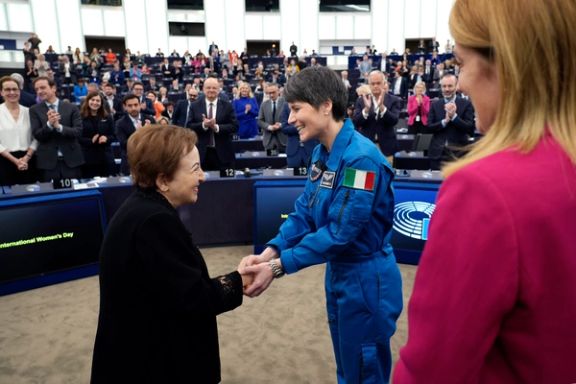
Describing the dire situation of imprisoned journalists, lawyers, artists, activists and young schoolgirls, she decried the absence of a functioning and independent justice system in Iran. "Don't look away from the immense violations of fundamental rights in Iran," she called on the MEPs.
Ebadi also urged the world to designate the Islamic Revolutionary Guard Corps – the IRGC – as a terrorist group. The 27-nation European bloc has so far stopped short of formally labelling the IRGC a terror group, despite calls to do so from Germany and the Netherlands as well as several rounds of rallies by Iranian diaspora communities to push for blacklisting the outfit. She categorically said, “the Revolutionary Guards is a terrorist group," and urged the UE to "say it officially."
Reassuring that Europe would benefit from a democratic Iran, she said if democracy is established in Iran, not only will the number of refugees fleeing from the region be reduced but also peace and calm will be brought back to the region. "Democracy is the key to Iran's future, it is the key to peace and stability in the whole region, and it is also in your interest," she argued. "If democracy comes to Iran, there will be fewer refugees in your country."
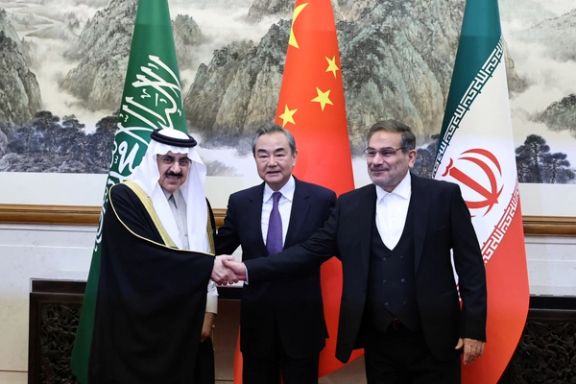
China, Russia and Iran have started maritime drills in the Gulf of Oman, less than a week after Tehran and Riyadh agreed to restore ties with Chinese mediation.
China’s defense ministry announced Wednesday that the drills will last from March 15-19 and “deepen practical cooperation among the navies of participating countries.”
Although it is not the first time the three countries hold joint naval drills in the Gulf of Oman and the Indian Ocean, the announcement coming on the heals of the Saudi-Iranian rapprochement might be a signal by Beijing about its intentions to expand influence in the region.
The drills also coincide with reports that China intends to hold a summit of Arab countries and Iran later this year. The Wall Street Journal quoted diplomatic sources that when Chinese President Xi Jinping visited Saudi Arabia for a regional summit with Persian Gulf Arab states in December, he proposed a high-level gathering of the Gulf Cooperation Council members and Iran in Beijing in 2023.
Most analysts agree that restoration of diplomatic ties between Iran and Saudi Arabia does not mean an overnight resolution to serious differences in their complicated relations. US officials have been quoted as being skeptical about Tehran delivering on what it has promised Riyadh, which is probably pursuing limited goals of reducing tensions rather than forging close relations with Tehran.
But most interestingly, Reuters briefly quoted the Saudi finance minister Wednesday as saying that there are a lot of opportunities for investments in Iran and he does not see an impediment as long as terms of agreements are respected by Tehran.
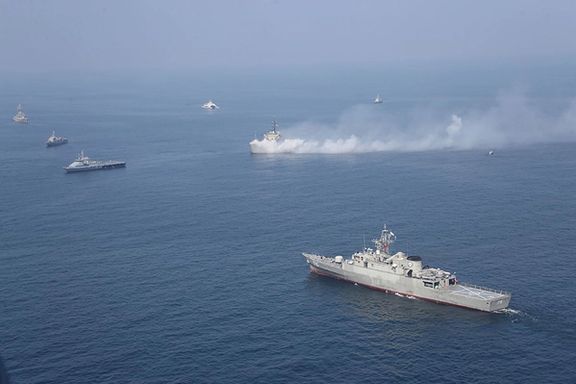
This is going much farther than a cordial resumption of diplomatic ties, and it would mean that the Saudis are willing to throw a lifeline to the beleaguered clerical rulers in Tehran who face a bankrupted economy.
Any Saudi economic dealing with Iran would also directly undercut US sanctions imposed to pressure Tehran, if not violating them outright. But dangling the prospect of foreign investment that Iran has no chance of securing in the current situation, might be a powerful tool.
There have been speculations that Beijing might try to solve the issue of Iran’s nuclear program that has extremely worried the Saudis, and eluded the Americans. In such a scenario, when tens of billion of dollars in Iranian assets are blocked worldwide, the prospect of Saudi investments could be a powerful lever to cajole Tehran to agree to a Chinese brokered agreement limiting its nuclear program.
Nevertheless, at this juncture, a regional rapprochement seems to be moving ahead fast. Nour News, a website in Tehran close to the national security council reported Wednesday that Iran's Supreme National Security Council secretary Ali Shamkhani will visit the United Arab Emirates on Thursday.
"Shamkhani will travel to Abu Dhabi on Thursday in response to an official invitation by his Emirati counterpart Sheikh Tahnoun bin Zayed Al Nahyan to discuss bilateral, regional, and international issues," Nour News said.
"Top economic, banking and security officials will accompany the Supreme National Security Council secretary to the UAE," it added.
Improvement of not only diplomatic but economic relations between GCC members and Iran could be a signal that plans to expand and strengthen the Abraham Accords between Israel, the United States and Arab countries will take the back seat.
This would also be a serious blow to US ‘maximum pressure’ strategy against Iran to push it toward a nuclear agreement that would perhaps include other provisions to limit Iran’s damaging activities in the region. If Saudis can tame Tehran with their own methods, the US role will be diminished as a security guarantor for the Kingdom.
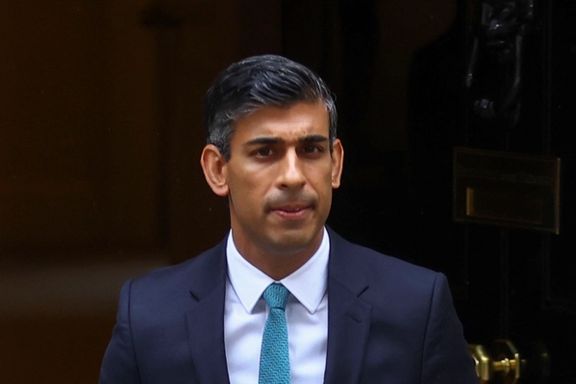
As Britain announced its new blueprint for security and international policy on Monday, Iran’s support for Russia was of grave concern.
The UK declared that the UK's security hinged on the outcome of the Ukraine war and expressed concern at support for Russia being potentially offered by China and Iran.
"China’s deepening partnership with Russia and Russia’s growing cooperation with Iran in the wake of the invasion of Ukraine are two developments of particular concern," Britain's Integrated Review (IR) said.
It has been revealed that Iran is providing Russia with drones, ammunition and missiles, in its ongoing war in Ukraine which began one year ago. In its wake, numerous crises have followed including a global food and energy supply shortage.
The decision to still not describe China as a bigger threat was likely to disappoint many in Prime Minister Rishi Sunak's governing Conservative Party, who also believe his vow to spend an extra 5 billion pounds ($6 billion) on defence is insufficient to support Ukraine without leaving Britain vulnerable.
It will also be disappointing for many that Iran did not take greater precedence in the reports, not least, given the recent evidence of the Islamic Regime being found to have tried to carry out terror acts on UK soil, including plots to kidnap Iran International journalists.
With Sunak under pressure to do more to help the defence ministry combat inflation and replace weapons sent to Ukraine, two billion pounds will go towards replenishing and increasing conventional stockpiles and investing in munitions infrastructure.
In the refresh of Britain's blueprint for security and international policy, the government warned of China’s deepening partnership with Russia, and Moscow’s growing cooperation with Iran following the invasion of Ukraine.
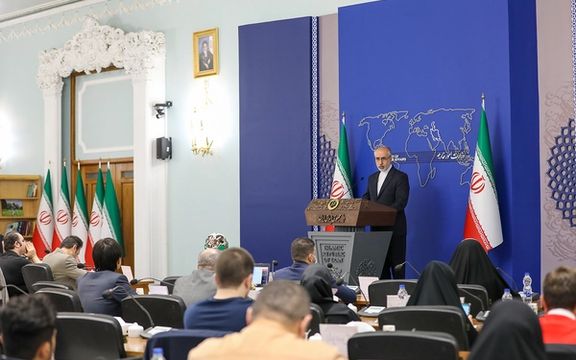
After the recent announcement of the détente with Saudi Arabia, the Islamic Republic hopes this will expedite rapprochement with other regional nations.
Speaking at his last press conference in the current Iranian year -- which ends on March 20 – the country’s Foreign Ministry Spokesman Nasser Kanaani said not only will the detente benefit the two nations, but expand diplomatic horizons and regional peace, especially in the Persian Gulf.
“Fortunately, with the positive atmosphere that we are witnessing in the region, this positive development [the deal with Saudi Arabia] can happen in connection with other regional countries as well, including Bahrain.
“We should further trust the path of diplomacy and take steps in this direction,” he explained, adding that the region would also benefit from a similar détente in relations between Iran and Egypt.
“Egypt is an important country and the two countries value each other in the region. The region needs the synergy of Tehran and Cairo,” he added. “The Islamic Republic’s principled policy is strengthening relations with its neighbors. We are [also] definitely ready to develop ties with Jordan.”
After five long rounds of talks spanning Baghdad, Muscat and Beijing, the agreement would see the two archenemies restore diplomatic ties and reopen embassies seven years after their relations were severed.
Saudi Arabia cut ties with Iran in 2016 after its embassy in Tehran was stormed during a dispute between the two countries over Riyadh's execution of a Shi'ite Muslim cleric.
The kingdom also has blamed Iran for missile and drone attacks on its oil facilities in 2019 as well as attacks on tankers in Persian Gulf waters. Iran denied the charges.
Yemen’s Iran-aligned Houthi movement has also carried out cross-border missile and drone attacks into Saudi Arabia, which leads a coalition fighting the Houthis, and in 2022 extended the strikes to the United Arab Emirates.
Kanaani said that embassies in Tehran and Riyadh and consulates in Mashhad and Jeddah will reopen within two months, though this two month period is time for Saudi to assess the behavior and commitment of the regime as it lays out conditions for the relationship. Among the most contentious issues, is Iran’s refusal to agree to controls over its regional proxies or the activities of the IRGC.
Saudi Foreign Minister Prince Faisal bin Farhan bin Abdullah openly stated that the agreement to restore relations with Iran does not mean disputes have been resolved. In an interview with London-based Asharq Al-Awsat, he said the agreement announced March 10 in Beijing with Chinese mediation and apparent guarantees, shows a joint desire by Iran and Saudi Arabia to “resolve disputes through communication and dialogue,” but “this does not mean that an agreement has been reached to resolve all pending disputes between them.”
Touching on the issue of the war in Yemen, Kanaani said the end of the war on the impoverished country has always been one of the top priorities of the Islamic Republic. “It is expected that the new positive atmosphere, which has been formed in the Iran-Saudi relations, will have positive and good results in the issue of Yemen.”
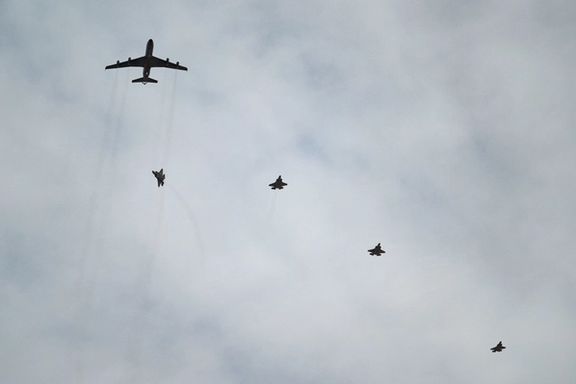
The Israeli and US Air Force began a two-week joint training drill named Red Flag in Nellis Air Force Base, Nevada, on Sunday.
According to the Israeli Defence Forces, the exercise aims to achieve “aerial superiority in the region” as it works on drills including "long-range aerial scenarios" in hints at a possible attack on Iran’s nuclear facilities.
The statement said the two week exercise will include a wide-range of capability training such as joint aerial strikes, area defense, interception of enemy aircraft, low-altitude flights and flights in areas abundant with anti-aircraft equipment.
The exercise will also include joint midair refuelings, where Israeli Air Force tanker aircraft will refuel American fighter jets, and an IAF F-35I “Adir” aircraft will be refueled by American KC-135 Stratotanker aircraft.
The exercise comes a few days after a meeting between US and Israeli officials in Washington, where the two countries pledged to prevent the Islamic Republic from acquiring nuclear weapons and further deter the hostile activities of Tehran in the region.
For the first time, seven IAF F-35I “Adir” aircraft and two IAF F-15I "Ra'am" aircraft will participate in the exercise in US territory. The exercise is taking place following the "Juniper Oak" exercise, the largest joint exercise to be conducted with USCENTCOM.
“The Red Flag exercise strengthens the operational cooperation between the two militaries as key partners committed to maintaining security in the Middle East,” the IDF spokesman’s unit said.